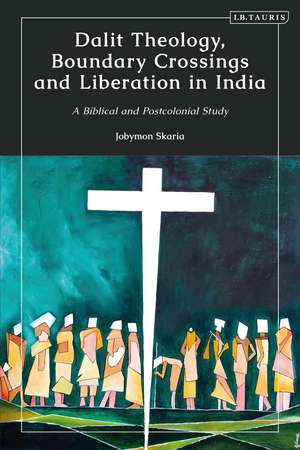Dalit Theology, Boundary Crossings and Liberation in India: A Biblical and Postcolonial Study
Autor Jobymon Skariaen Limba Engleză Paperback – 26 iun 2024
| Toate formatele și edițiile | Preț | Express |
|---|---|---|
| Paperback (1) | 191.22 lei 6-8 săpt. | +70.80 lei 6-12 zile |
| Bloomsbury Publishing – 26 iun 2024 | 191.22 lei 6-8 săpt. | +70.80 lei 6-12 zile |
| Hardback (1) | 510.42 lei 6-8 săpt. | |
| Bloomsbury Publishing – 30 noi 2022 | 510.42 lei 6-8 săpt. |
Preț: 191.22 lei
Preț vechi: 249.30 lei
-23% Nou
Puncte Express: 287
Preț estimativ în valută:
36.60€ • 37.92$ • 30.54£
36.60€ • 37.92$ • 30.54£
Carte tipărită la comandă
Livrare economică 21 martie-04 aprilie
Livrare express 13-19 februarie pentru 80.79 lei
Preluare comenzi: 021 569.72.76
Specificații
ISBN-13: 9780755642397
ISBN-10: 0755642392
Pagini: 232
Dimensiuni: 156 x 234 x 25 mm
Greutate: 0.33 kg
Editura: Bloomsbury Publishing
Colecția I.B.Tauris
Locul publicării:London, United Kingdom
ISBN-10: 0755642392
Pagini: 232
Dimensiuni: 156 x 234 x 25 mm
Greutate: 0.33 kg
Editura: Bloomsbury Publishing
Colecția I.B.Tauris
Locul publicării:London, United Kingdom
Caracteristici
The first book-length study on Dalit theology by an Indian St Thomas Christian Scholar
Notă biografică
Jobymon Skaria is an Indian Syrian Orthodox priest, is a part-time Lecturer at The Malankara Syrian Orthodox Theological Seminary, Kerala, India. He received his PhD from Dublin City University, Ireland.
Cuprins
1. Dalit Theology: Some Introductory Remarks 2. Genealogy of Dalit Theology Seen Through Dalits' Cries for Dignity3. Genealogy of Dalit Theology Seen Through Liberation Theologies4. Questioning Dalit Theology Through Dalits' Forgotten Voices5. Decentring Dalit Theology Through Dalits' Forgotten Voices6. Situating Abraham's Postcolonial Crossings as a Partner in Dialogue7. Exploring Abraham's Crossings to Egypt and Gerar8. Reimagining Dalit Theology Through Dalits' Forgotten Voices9. My Crossings, Liberating Dalit Theology and Dalit-Syrian Christian Dialogues
Recenzii
This fascinating and timely work examines the boundless theological riches within Dalit cultural, literary and philosophical traditions and explores their potential for constructing a post-colonial Dalit theology. Its strength lies in its honesty in calling upper-caste Indian Christians to repentance for their continuing complicity in discrimination against the Dalit communities.
One of the inescapable tasks facing those from socially privileged and traditionally prominent communities within Indian Christianity is regarding the relevance of Dalit theology and the obligations that this poses to theologizing today. Those coming from such backgrounds cannot continue the theological enterprise with haughty indifference to voices that they have disregarded, discounted, silenced, and stifled down the centuries. This work is a sincere attempt to wrestle with this task, respectfully engaging with and allowing these voices to interrogate, question, disrupt, and indeed dictate the directions of 21st century Indian Christian theology through heartfelt repentance, thereby paving the way to possible reconciliation and a shared commitment to social and theological transformation.
What does it mean to look into one's privileged tradition through the eyes of the marginalized and for a Non-Dalit to listen and learn from Dalits? In this courageous, learned, and honest biblical and interdisciplinary work, Jobymon Skaria assesses key stories of Abraham for possible answers, showing how dialogue and liberation require truth-seeking, reconciliation, and faith in one's God, self, and the other.
One of the inescapable tasks facing those from socially privileged and traditionally prominent communities within Indian Christianity is regarding the relevance of Dalit theology and the obligations that this poses to theologizing today. Those coming from such backgrounds cannot continue the theological enterprise with haughty indifference to voices that they have disregarded, discounted, silenced, and stifled down the centuries. This work is a sincere attempt to wrestle with this task, respectfully engaging with and allowing these voices to interrogate, question, disrupt, and indeed dictate the directions of 21st century Indian Christian theology through heartfelt repentance, thereby paving the way to possible reconciliation and a shared commitment to social and theological transformation.
What does it mean to look into one's privileged tradition through the eyes of the marginalized and for a Non-Dalit to listen and learn from Dalits? In this courageous, learned, and honest biblical and interdisciplinary work, Jobymon Skaria assesses key stories of Abraham for possible answers, showing how dialogue and liberation require truth-seeking, reconciliation, and faith in one's God, self, and the other.
